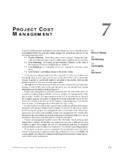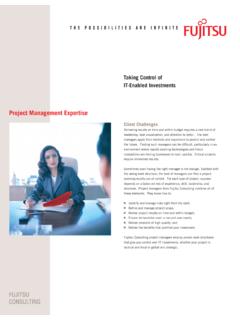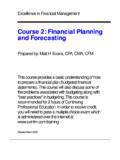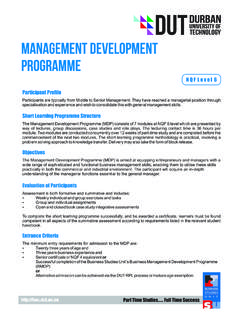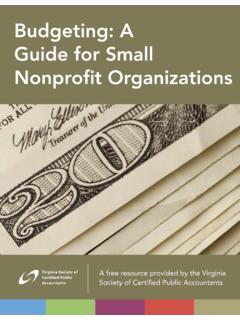Transcription of BUSINESS TOOL KIT: THE BUDGETING PROCESS
1 Pro Active Mgt & Training Ltd (PAMT). Whilst every care has been taken in the preparation of this document, PAMT or Cultivate can not be held liable beyond statutory liability for errors or omissions. The information is for general guidance only. You should neither act, nor refrain from action, on the basis of any such information. You should take appropriate professional advice on your particular circumstances because the application of laws and regulations will vary depending on particular circumstances and because laws and regulations undergo frequent changes.
2 1 BUSINESS tool KIT: THE BUDGETING PROCESS There are a number of well-documented factors determining organisation success, client satisfaction, good service delivery, motivated workforce, good management etc. Underlying all successful organisations is an effective system of planning and control. The implementation and use of BUDGETING can make a valuable contribution to that PROCESS . A budget is a plan expressed in financial terms. It stems from our defined objectives for the future, and acts as a target that we wish to achieve.
3 Planning for our BUSINESS tends to be more advantageous than running it as a 'seat of the pants' operation and effective BUDGETING helps in: motivation control management decision making risk minimisation It is important to remember that when we budget we need to focus on the future, and in doing so a consideration of the past and present is necessary. A consideration of the future takes into account qualitative and quantitative factors, BUDGETING is not a solitary financial exercise and the budget should not end up an 'albatross' round our necks.
4 IN THE BEGINNING BUDGETING needs to be approached in a structured and considered way if it is to be effective and meaningful. We need to consider various factors in this respect such as: who to involve in the PROCESS when to begin the PROCESS when to complete the PROCESS what respective roles and responsibilities should be Pro Active Mgt & Training Ltd (PAMT). Whilst every care has been taken in the preparation of this document, PAMT or Cultivate can not be held liable beyond statutory liability for errors or omissions.
5 The information is for general guidance only. You should neither act, nor refrain from action, on the basis of any such information. You should take appropriate professional advice on your particular circumstances because the application of laws and regulations will vary depending on particular circumstances and because laws and regulations undergo frequent changes. 2 Who to involve In some organisations just one person without involvement from the people who will have to implement it produces the budget. This lack of involvement and ownership usually results in meaningless budgets, contributing nothing to management, control or motivation within the BUSINESS .
6 Each manager should be initially responsible for preparing his or her own budgets. Obviously overall organisational objectives, assumptions etc. will guide the manager in question, the finished budget will be subject to review and modification - real involvement is the key. When to begin and complete We should begin the BUDGETING PROCESS for the next year before our current year has finished. Since we are looking to the future an appreciation and evaluation of our current year is important, there is little merit in beginning the BUDGETING PROCESS right at the beginning or right at the end of the current year.
7 There is no set time to begin BUDGETING but as a general rule of thumb we will usually start BUDGETING for the next year after about 6-8 months of our current year has elapsed. The time scale needs to be considered in light of the complexity and size of our organisation. We need to strike a balance between relevance, accuracy and letting people be aware of the following years budget. Roles and responsibilities It is a good idea to consider who will be involved in the BUDGETING PROCESS , what action they will require and when this should be completed.
8 Someone needs to co-ordinate the whole PROCESS and encourage people along as required. In a larger organisation more people will be involved in the PROCESS , whereas in a smaller organisation roles and responsibilities will be concentrated. A BUDGETING timetable will consolidate all the above and needs to be communicated to and understood by all involved. Timings should not be too tight so as to make them impossible to achieve, nor should they be too loose that the whole PROCESS drifts. WHAT TO BUDGET FOR Our budget, a plan expressed in financial terms, will reflect our BUSINESS objectives for the following year.
9 The budget needs to be sales and not cost driven. We will need to draw up individual/key budgets, which will be eventually consolidated, into three master budgets: income and expenditure account (profit and loss) balance sheet certainly for larger organsiations cash budget Pro Active Mgt & Training Ltd (PAMT). Whilst every care has been taken in the preparation of this document, PAMT or Cultivate can not be held liable beyond statutory liability for errors or omissions. The information is for general guidance only.
10 You should neither act, nor refrain from action, on the basis of any such information. You should take appropriate professional advice on your particular circumstances because the application of laws and regulations will vary depending on particular circumstances and because laws and regulations undergo frequent changes. 3 Some of the key budgets that will need to drawn up are income wages overheads capital expenditure The income budget is our central budget and the one that is the most difficult to estimate.




